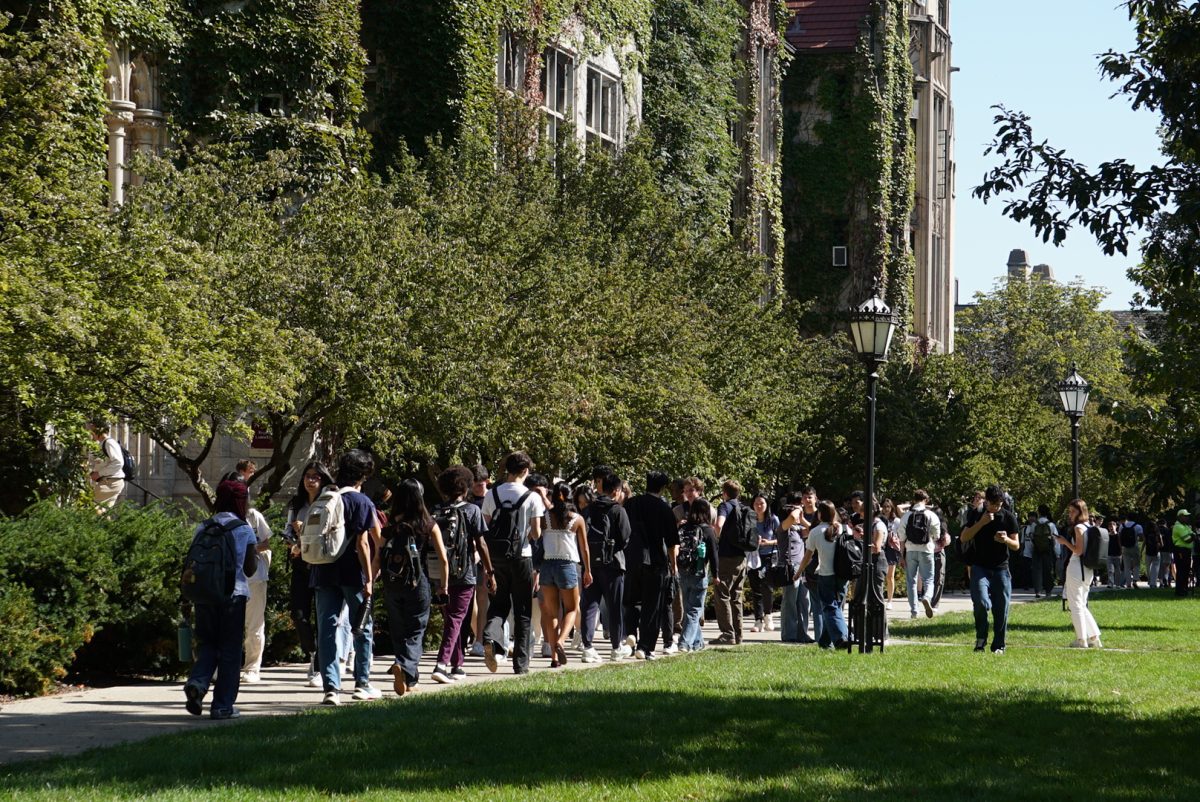If you spend any amount of time around graduate students, you’ll be met with a potent cocktail of depression, excitement, anxiety, and existential dread. Graduate school is hard on us for a number of reasons, especially for those living far away from family and friends, but it is also a hugely rewarding experience that opens doors into new careers and gives us opportunities to hone our skills. Yet there’s something uniquely broken about the Social Sciences Division’s (SSD) Master of Arts (M.A.) programs here. UChicago has built up a reputation for being where fun goes to die; when it comes to SSD M.A. programs, though, fun dies because UChicago pushes its master’s students to their breaking points while emptying their pockets in the process.
Institutionally, these programs are—in a word—brutal. But the people who teach within them are passionate educators and incredible resources—it would be unfair to write this piece without at least acknowledging the distinction between institutional failure and individual excellence. I would be remiss if I did not say that the teaching, advice, and training from faculty are top-tier. But this is common knowledge, and it forms the backbone of the allure of the M.A. programs––it’s easier to perpetuate harm if students receive top-tier educational experiences. There are definite benefits. This piece, however, is instead about the harm students experience within the program itself, rather than a critique of the people within them.
The University of Chicago’s SSD consists of three main M.A. programs: the Master of Arts Program in the Social Sciences (MAPSS), the Master of Arts in Computing Sciences (MACS), and the Committee on International Relations (CIR). All three provide a rigorous, cross-disciplinary approach to coursework and are unique programs that can help students discover their interests and enable deeper engagement within a particular field of study. Some students in CIR go on to work in consulting, are accepted into Ph.D programs, and work their way up to their professional goals. These programs can position students for success, but they do so at a cost. There are deep, structural problems with these programs—specifically MAPSS and CIR—which need to be addressed. I attended the CIR program from 2021–22 and was lucky enough to receive full funding. Other students aren’t quite as lucky.
Time
First, let’s talk about the pace of these programs. There simply isn’t enough time to adequately learn, write, and live in these programs. In short, they force you not merely to compromise on one of these three things but eliminate at least one of them entirely. You learn at the cost of living; you live at the cost of learning. Nine months—or three quarters—is precious little time under the best circumstances; it’s certainly not enough time to write a thesis, take three courses per quarter, apply for internships and jobs, and take care of yourself. The University’s decision to transition to a nine-week quarter—a policy implemented simultaneously across UChicago’s undergraduate and graduate programs—has served the express purpose of exacerbating students’ (already untenable) stress and anxiety. In an already truncated program, we lose a total of three weeks of time—a week for each quarter—dedicated to finishing class projects and preparing for exams. In exchange, we’re given a single week between the winter and spring quarters to recover. It does not work.
My work, like many others, required fieldwork; while I received funding, I had until early July to submit a first draft after finishing coursework on June 4. This works out to about a month or so to conduct fieldwork and polish theses after formally wrapping up coursework. It’s thankless, grueling work that feels futile, laughable, and exhausting in equal measure. It’s easy to argue that selecting a “realistic” thesis project might mitigate a number of these concerns, but at a school like ours, which touts “rigorous inquiry” as its most enduring commitment, writing the best, most well-researched project possible isn’t just an option, it’s a mandate. Being forced to sacrifice standards or data to meet arbitrary, ill-considered deadlines represents a flagrant rejection of UChicago’s longest-held principles. A reasonably allotted time for thesis write-up and fieldwork should be the standard for all graduate programs; instead we’re fed to the University’s productivity machine, expected to produce papers, take exams, finish projects, and likely work part-time while attempting to produce a work of scholarship that is, in theory, its own full-time job.
By the time we’re able to sit down with our thesis, we need to look for jobs, move away, or intern. One month after a grueling trudge through UChicago’s quarter system—all while we stress over what our next steps are—isn’t enough time to write, edit, review, polish, and rewrite scholarly work. While CIR offers internship and travel funding, MAPSS does not; summers are for writing theses. These programs don’t necessarily set anyone up for failure—but one year in a quarter system while trying to write a master’s thesis is a lot like trying to cook an egg on a stovetop without a pan: sure, you might be able to pull it off, but it’ll be a hard time, you’re going to have to make sacrifices, and the end result isn’t going to be nearly as good as it could be. If these programs are predicated on producing exceptional scholarship, the task of writing a publishable thesis within nine to 11 months while dealing with everything else on our plates is Sisyphean. Ph.D. programs within SSD at the University give students a full two years to conceptualize and write up their theses––why are M.A. programs unaffiliated with Ph.D. programs only given one year? We have less training than Ph.D. students and—since we don’t receive a stipend—have more to worry about.
A huge issue with these programs is that they are positioned as fast-paced opportunities to grow as a scholar, but they do not give you the time to actually do so. Fast-paced, of course, is a euphemism for unrealistic. The excuse that this is just the way things are, which older academics parrot, elides a conversation about how unrealistic it is to expect quality work from full-time students without giving us the appropriate time to work on our thesis projects. For older students with dogs, partners, jobs, and children, this task becomes increasingly unrealistic. I, like others I’ve talked to, skipped meals and classes to finish assignments and readings; everyone, from undergraduates to faculty, seems perpetually exhausted.
The University’s insistence on perpetuating a system seemingly designed to ignore or dismiss the well-being of its students and faculty isn’t just willfully ignorant; it’s actively damaging. It’s exhausting to be met with unsympathetic responses from faculty who shrug off systems of harm and trauma that they perpetuate—whether knowingly or not—or to be met with callousness from heads of departments and deans who ignore institutional deficiencies.
Money
These programs cost around $60,000 (not including rent, utilities, and groceries) and once the summer rolls around, the funding ends and we are expected to find jobs and internships while writing a publishable paper. One colleague of mine had to take out over $10,000 in loans over the summer in order to write their thesis. Loans for M.A. degrees have increased over the years—the percentage of master’s students who graduated with student loans was thirteen percent higher in 2015-16 than it was in 1999-2000—while the average debt held by graduate students is $71,000 (not including loans from their undergraduate years). Among all Americans, student loan debt has reached $1.7 trillion. Yet UChicago ended the 2021 fiscal year with an $11 billion endowment that UChicago’s Annual Report states is “driven by strong investment returns, generous alumni support, and prudent spending.” The immediate question is: why, then, exploit vulnerable M.A. students if the University is flush with cash rooted in prudent investment decisions? Why even charge so much? Perhaps this is naive, but one of the only reasons I can think of is to accumulate more wealth, which is the driving principle in our neoliberal economic system. The University is a business, and the driving logic of business in the United States is wealth accumulation. For a university that prioritizes its neoliberal Economics department (to the detriment of other SSD departments) and venerates a villain like Milton Friedman, it does not seem out of character. Alternatively, perhaps these programs fund Ph.D. programs (a common theory). Whatever the reason, M.A. students are a lucrative business transaction, and we are exploited.
SSD treats us like cash cows and expects us to write publishable theses without giving us the time and resources to do this, contributing to the continued exploitation of M.A. students in the United States. Sure, you can apply for grants, but grants are never enough or perpetually in short supply. But from a business perspective, M.A. programs make a lot of sense: charge premium prices for a prestigious degree that people will pay for. Anne Helen Petersen makes a compelling argument in her article, “The Masters Trap,” utilizing, in part, the case of two UChicago M.A. programs. The key point she makes in regard to M.A. programs making sense from a business perspective is that M.A. programs attract “a mix of first generation college students without mentors to guide them, high achievers enthralled by their perception of the academic lifestyle, international students desperate for a Green Card, students lacking the prestigious undergraduate degree or network needed to gain entry into exclusive creative industries, and students who believe that the degree they earn will be the career collateral they need to be successful.” There is always a demand, and SSD exploits these desires, fears, and the societal push for M.A. credentials. This “if you build it, they will come” mentality works well; the University knows it will always have a pool of applicants that will be willing to pay.
Perhaps the issue lies at the heart of academia itself—a rat race to produce papers, grad students, and books that keep the money flowing and increase the prestige of the University. One-year programs like SSD’s seek to produce one batch of graduate students as quickly as possible to open space for another batch, like an industrial assembly line. We are disposable inputs, ostensibly offered a leg up or an opportunity to jump start our career. I can’t help but wonder what cost these alleged advantages come at. What’s the price we’re forced to pay? Money? Sleepless nights? Skipped meals? Graying hair, trembling hands, perpetual emotional and mental fragility? Near-constant exhaustion? While we know that multitasking is not humanly possible, graduate programs (especially on the quarter system) demand a level of multitasking that isn’t healthy, or even viable, all while juggling impossible financial obligations. Graduate school made me feel like a machine, and the constant demand for production here has taken the joy out of institutional learning. Academia should not feel like a business, but at every level, that is exactly what it is: an enterprise rooted in on-demand production. When it comes to truisms, people seem fond of citing one often: if you’re not paying, you’re the product. Somehow, though, students in the University’s graduate programs end up being both product and consumer in a zero-sum game that they can’t seem to win.
Galen Tsongas is an alum of the Committee on International Relations master’s program, which is overseen by SSD.
Editor’s note: This article has been updated to clarify Tsongas’s degree program.







Marceline Murawski / Feb 23, 2023 at 6:45 pm
Graduate school is Darwinian if you go to a decent school. It was 30 years ago, and it is now. I am sorry to hear about your experience but it is not a new one.